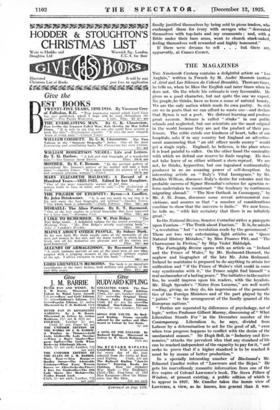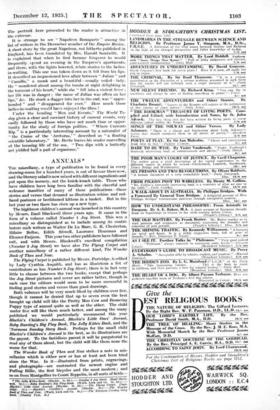THE MAGAZINES
THE Nineteenth Century contains a delightful article on " Les Anglais," written in French by M. Andre Maurois (author of Ariel and Les Silences du Colonel Bramble). There are times, he tells us, when he likes the English and rarer times when he does not. •On the whole his estimate is very favourable. He gives us a good character, but not quite the one we expect. No people, he thinks, have so keen a sense of natural beauty, We are the only nation which reads its own poetry. So rich are we in poets that we can afford to waste one—and declare that Byron is not a poet. We distrust learning and produce great savants. Science is called " stinks " in our public schools and neglected, but our scientists are the most original in the world because they are not the product of their pro- fessors. The critic extols our kindness of heart, talks of our hospitals, asks if in any country but England an advertise- ment announcing that " an old officer needs money " would get a single reply. England, he believes, is the place where it is least painful to suffer. On the other hand the comicality with which we defend our reserve he finds rasping. He does not take leave of us either without a stern reproof. We are not, he thinks, hypocrites, but our ingrained sentimentality produces in us an amazing power of self-deception. An interesting article on " Italy's Vital Insurgence," by Mr. Beckles Willsan, discusses Italy's desire for colonies and the probable success of Signor Mussolini's scheme for agrarian re- form undertaken to counteract " the tendency to continuous migrating abroad." " The New Outlook in Cosmogony," by Mr. J. H. Jeans, discusses some recent astronomical con- victions, and assures us that a number of considerations combine to show that the universe is finite." We now know, he tells us, " with fair certainty that there is no infinitely great."
In the National Review, Senator Corradini writes a panegyric upon Fascism—" The Truth about Fascism." It is, he admits
a revolution " but " a revolution made by the government." There are two very entertaining light articles on " Queer Natural History Mistakes," by Miss Frances Pitt, and " The Charwoman in Fiction," by Mis,,s Violet Biddulph.
The Fortnightly Review opens with an article on " Ireland and the Prince of Wales," by Mr. Redmond-Howard, the nephew and biographer of the late Mr. John Redmond. Ireland he maintains is prepared to do anything to attain her unification and " if the Prince of Wales's visit could in some way synchronize with it," the Prince might find himself " a real ambassador of a lasting peace." The initiative in the matter lies, he would impress upon his readers, with the loyalists. Mr. Hugh Spender's "Notes from Loearno," are well worth reading, giving, as they do, his impressions of the personali- ties of the Foreign Ministers and of the part played by the " jurists " "in the arrangement of the family quarrel of the European nations."
" Parties are separated by differences of psychology, not of logic," writes Professor Gilbert Murray, discoursing of " What Liberalism Stands For " in the December number of the Contemporary. Liberalism is, he says, divided from Labour by a determination to act for the good of all, " even when true progress happens to conflict with the desire of the uneducated masses." Sir Hugh Bell, in "Industry and Eco- nomies," attacks the prevalent idea that any standard of life can be reached independent of the capacity to pay for it, " and seeks to prove that if a higher standard is to be reached it
must be by means of better production." .
In a specially interesting number of Blacl-wood's Mr. Edmund Candler writes of "Lawrence and the Hejaz." He gets his marvelously romantic information from one of the five copies of Colonel Lawrence's book, The Seven Pillars of Wisdom, at present existing, a public edition of which is to appear in- 1927. Mr. Candler takes the heroic view of Lawrence, a view, as he knows, less general than it was.
The portrait here presented to the reader is attractive in the extreme.
It is strange to see " Napoleon Bonaparte " among the list of writers in the December number of the Empire Review. A short story by the great Napoleon, not hitherto published in England, has been translated by Mrs. Harold Sandwith. It is explained that when he first became Emperor he would frequently, spend an evening in the Empress's apartments, and there, with the lights lowered, relate stories to the ladies- in-waiting. This one was taken down as it fell from his lips. It described an impassioned love affair between " Julian " and " Camillo," a monk and a beautiful—usually veiled—lady. He " wandered about among the tombs at night delighting in the torment of his heart," while she " fell into a violent fever ; her life was in danger ; the name of Julian was often on her lips," Jez. He stuck a dagger into her in the end, was " appre- hended " and, " disappeared for ever." How much those ladies-in-waiting would have enjoyed the films !
Under the heading " Men and Events," The World To- day gives a clear and succinct history of current events, very easily followed by those who have not much time or oppor- tunity for the study of foreign polities. " Where Currents Rip " is a particularly interesting account by a naturalist of " the Cruise of the • Arcturus,' " described as " a floating scientific laboratory." Mr. Beebe leaves his reader marvelling at the teeming life of the sea. " Two dips with a butterfly net yielded half a pail of organisms."























































 Previous page
Previous page